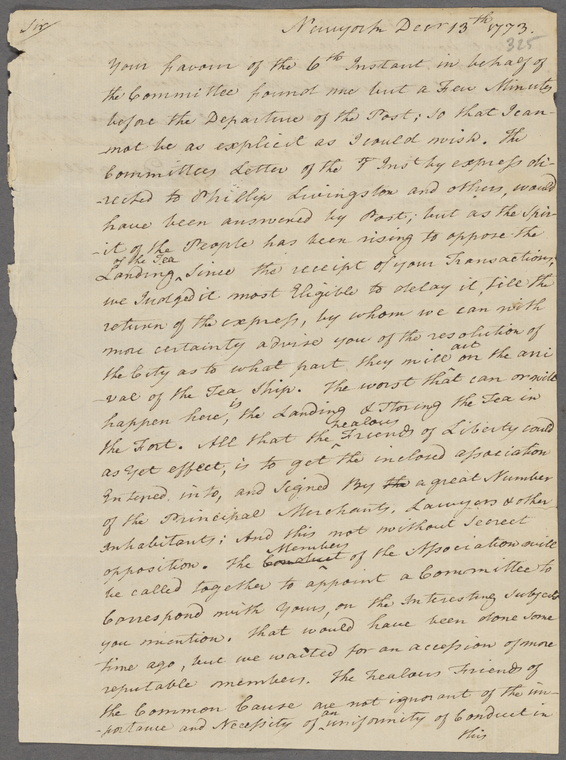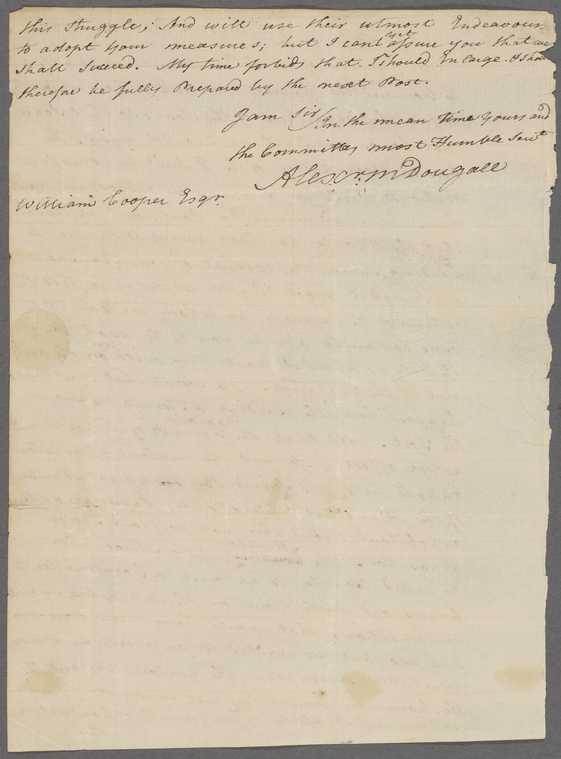Archives
Reintroducing the Boston Committee of Correspondence Records
Looking back on the Revolution in 1815, John Adams remarked that “The History of the United States never can be written” without the records of the Boston Committee of Correspondence. When it was formed in 1772, the BCC was the closest thing to an organizing body of the nascent American revolutionary movement. From that year through 1774, when the First Continental Congress met in Philadelphia, the BCC corresponded with similar committees in hundreds of Massachusetts towns, as well as from every one of the thirteen colonies. It was the central node in a growing revolutionary network. According to Adams at least, the BCC was not merely significant for American history but also for world history. He argued that the BCC provided a model for future European revolutions.[1]
Though New York is perhaps an unlikely home the BCC records, they have been in the main branch on 42nd street since it first opened in 1911. The Lenox Library—which, along with the the Astor Library and the Tilden Trust consolidated to form NYPL—acquired the BCC records in 1893, when it purchased the library of George Bancroft, the famous nineteenth-century historian.


As part of an ongoing project to digitize large portions of the New York Public Library’s early American manuscript collections, NYPL has made the records of the Boston Committee of Correspondence freely available online. Over the next couple of months, I’ll periodically blog about the collection, especially with an eye toward making it accessible for students. And we certainly hope this will reinvigorate researchers’ interest in the collection. But keeping with the Library’s mission to make knowledge available to all, we hope everyone who is interested in the history of the American Revolution will also dive into this rich material.
[1] Adams quoted in Richard D. Brown, Revolutionary Politics in Massachusetts: The Boston Committee of Correspondence and the Towns, 1772-1774 (Cambridge, MA: Harvard University Press, 1970), vii. A transcription of the full letter is available at Founders Online.
About the Early American Manuscripts Project
With support from the The Polonsky Foundation, The New York Public Library is currently digitizing upwards of 50,000 pages of historic early American manuscript material. The Early American Manuscripts Project will allow students, researchers, and the general public to revisit major political events of the era from new perspectives and to explore currents of everyday social, cultural, and economic life in the colonial, revolutionary, and early national periods. The project will present on-line for the first time high quality facsimiles of key documents from America’s Founding, including the papers of George Washington, Thomas Jefferson, Alexander Hamilton and James Madison. Drawing on the full breadth of the Library’s manuscript collections, it will also make widely available less well-known manuscript sources, including business papers of Atlantic merchants, diaries of people ranging from elite New York women to Christian Indian preachers, and organizational records of voluntary associations and philanthropic organizations. Over the next two years, this trove of manuscript sources, previously available only at the Library, will be made freely available through nypl.org.
Read E-Books with SimplyE
 With your library card, it's easier than ever to choose from more than 300,000 e-books on SimplyE, The New York Public Library's free e-reader app. Gain access to digital resources for all ages, including e-books, audiobooks, databases, and more.
With your library card, it's easier than ever to choose from more than 300,000 e-books on SimplyE, The New York Public Library's free e-reader app. Gain access to digital resources for all ages, including e-books, audiobooks, databases, and more.
If you don’t have an NYPL library card, New York State residents can apply for a digital card online or through SimplyE (available on the App Store or Google Play).
Need more help? Read our guide to using SimplyE.
Comments
Boston Committee of Correspondence Records
Submitted by Virginia Smith ... (not verified) on October 16, 2015 - 9:38am
Hadley, MA
Submitted by Mark Boonshoft on November 16, 2015 - 7:53pm
Boston Committee of Correspondence Records
Submitted by Joan Lince (not verified) on October 25, 2015 - 7:57pm
Hi Joan, Here is the finding
Submitted by Mark Boonshoft on November 16, 2015 - 7:50pm
Terrific!
Submitted by Ed Bell (not verified) on February 6, 2016 - 3:13pm
Very glad to hear from you,
Submitted by Mark Boonshoft on February 8, 2016 - 12:18pm